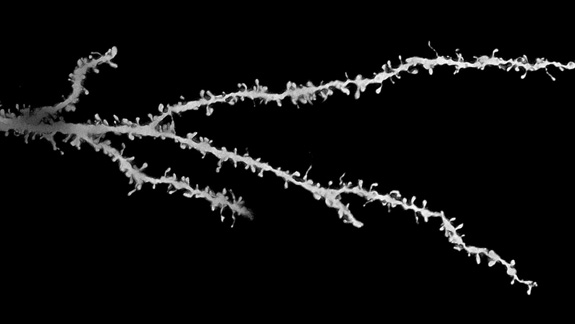Study Offers Clues To How Autism Develops

A new study finds that children with autism have extra synapses, which can affect how the brain functions. Synapses connect neurons, like the one pictured, to each other. (Guomei Tang, PhD and Mark S. Sonders, PhD/Columbia University Medical Center)
Kids with autism retain extra brain connections that other children weed out during development, researchers say in a new study that suggests drugs may be able to correct the issue.
The connections, known as synapses, allow neurons in the brain to communicate with each other. Typically, as children grow, they go through a pruning process to limit the number of synapses.
However, that does not appear to occur properly in children with autism, leaving such youngsters with too many synapses which can affect how the brain functions, according to findings published online Thursday in the journal Neuron.
Advertisement - Continue Reading Below
“It’s the first time that anyone has looked for, and seen, a lack of pruning during development of children with autism,” said David Sulzer, a professor of neurobiology at the Columbia University Medical Center who worked on the study.
The finding could help explain how autism develops and point to avenues for treating the developmental disorder, researchers say.
For the study, scientists looked at brain tissue from 26 individuals with autism ages 2 to 20 as well as samples from 22 children without the developmental disorder, all of whom had died from other causes. In the typically-developing children, the number of brain connections dropped by about half by late childhood, the study found, while those with autism only saw a reduction of 16 percent.
Using a mouse model of autism, the scientists traced the pruning problem to a protein called mTOR. They were then able to treat the issue in the mice using the drug rapamycin.
While the medication may not be safe for human use, the researchers indicated that other drugs could potentially be developed to correct the oversupply of synapses.
“The fact that we can see changes in behavior suggests that autism may still be treatable after a child is diagnosed, if we can find a better drug,” Sulzer said.
Read more stories like this one. Sign up for Disability Scoop's free email newsletter to get the latest developmental disability news sent straight to your inbox.

